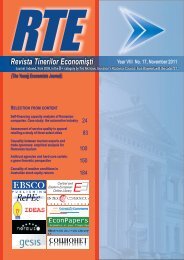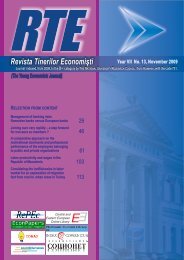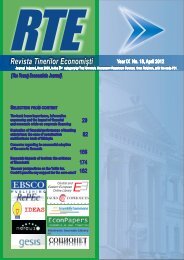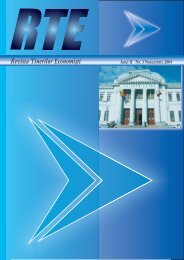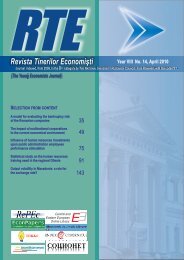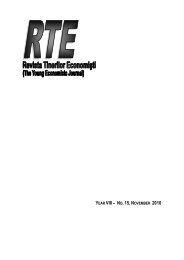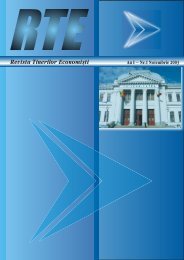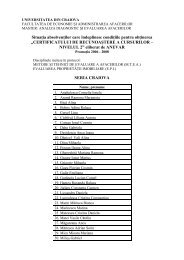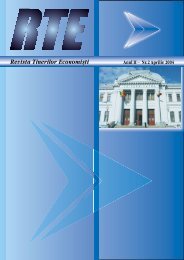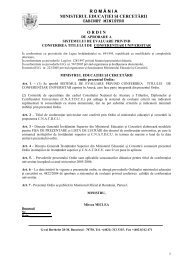Revista Tinerilor Economiºti (The Young Economists Journal)
Revista Tinerilor Economiºti (The Young Economists Journal)
Revista Tinerilor Economiºti (The Young Economists Journal)
You also want an ePaper? Increase the reach of your titles
YUMPU automatically turns print PDFs into web optimized ePapers that Google loves.
Management – Marketing - Tourism<br />
- Increase of the value of imported goods not liable to customs clearance from 100 to<br />
300 CHF (€60 – 180);<br />
- Decline of consumer confidence in the Swiss local retailers;<br />
- Relatively high price difference between Swiss (expensive) and EU goods (cheap);<br />
- A shift of attitude of Swiss consumers in favour of EU-goods.<br />
We have also to include the costs of establishing new stores among the<br />
economic factors. Such costs are connected with the acquisition or leasing of sites for<br />
stores, and also with establishing them. Furthermore costs for various facilities such as<br />
outdoor provisions and parking lots are to calculate. Last not least communication<br />
efforts are to be financed in order to attract customers [Omar, 1999, p.35].<br />
Even though costs of retail sites have been declining since 2008 they still are an<br />
important factor for every company. In 2009, the monthly rent for 100 square meters of<br />
retail space in Cluj-Napoca varied between €15 and 40 depending on the location<br />
(excluding VAT). According to real estate experts, retailer have to add maintenance<br />
costs (€2 – 2.5 per m 2 ) as well as a “marketing fee” of €1.5 – 3 per m 2 . <strong>The</strong> “marketing<br />
fee” includes the monthly cost of joint advertising and promotion conducted by the<br />
shopping center’s management. Retail space rents have declined by 40-70% from 2008<br />
to 2010 [Botezatu, 2010; Roman, 2010].<br />
2. Political and legislative factors<br />
<strong>The</strong> legal framework set by the World Trade Organizations (WTO) - and even<br />
more important for Europe by the EU – enforces free trade, and opens new markets to<br />
national companies. In this regard, we emphasize the liberalization of world trade by<br />
agreements (GATT, GATS, TRIPS, WTA, ATC) of the WTO Member States, designed<br />
to lead to a comprehensive reintegration of world trade [Zentes, Swoboda, 2001, pp.11-<br />
14] with industrial, agricultural, textiles (ATC), services (GATS) and intellectual<br />
property rights (TRIPS), and also with regional trade agreements.<br />
A stationary retailer may take advantage of different specific forms of operation<br />
when extending to foreign markets [Zentes, Ferring, 1995, pp.410-436; Zentes,<br />
Swoboda, Schramm-Klein, 2010, p.343]:<br />
- Foundation and development of subsidiary companies with offices (branches) in the<br />
foreign country; this is supposed to be the most successful form of intruding a<br />
foreign market;<br />
- Acquisitions of local retailers (acquisition strategy) or local retail chains. This<br />
accelerates to some extent the adaptation process to foreign markets and their<br />
specifics conditions. This includes knowledge of local competitors and their<br />
strengths, but also of specific habits, values and traditions of customers; the<br />
acquired local firms will have competence also with regard to suppliers and<br />
producers of goods. Furthermore no valuable time is lost for market research; some<br />
legal complications when starting off with new own offices may also be avoided.<br />
Acquiring local or national retailers can also be seen as a phenomenon of economic<br />
globalization, possibly connected with concentration of retail power.<br />
- Cooperation with local retailers (cooperative strategy) by development of franchise<br />
stores, granting of licenses or engaging in joint ventures. <strong>The</strong>se situations can be<br />
the result of legal restrictions that prevent the establishment of representative<br />
offices or branches; a local partner may also be preferred due its potential easier<br />
access to some raw materials or technologies. For example, Metro, the second<br />
European retailer according to turnover, preferred to penetrate the Chinese market<br />
65



